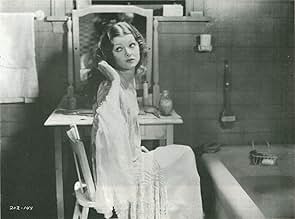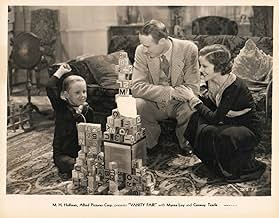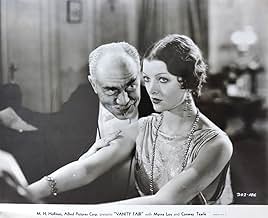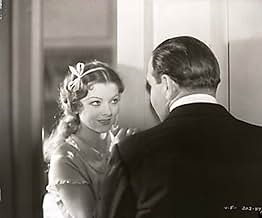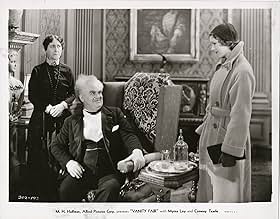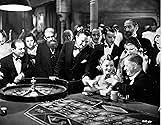Esta adaptación cinematográfica de la novela de William Makepeace Thackeray marca el primer papel protagónico de Myrna Loy.Esta adaptación cinematográfica de la novela de William Makepeace Thackeray marca el primer papel protagónico de Myrna Loy.Esta adaptación cinematográfica de la novela de William Makepeace Thackeray marca el primer papel protagónico de Myrna Loy.
- Dirección
- Guionistas
- Elenco
Ray Culley
- Casino patron
- (sin créditos)
Bill Elliott
- Minor Role
- (sin créditos)
Tom Ricketts
- Sir Pitt's Butler Parker
- (sin créditos)
- Dirección
- Guionistas
- Todo el elenco y el equipo
- Producción, taquilla y más en IMDbPro
Opiniones destacadas
Rather affecting little morality flick adapted from the classic novel of same name. Wow, Becky Sharp is one sharp looking cookie. As Becky, Loy turns every rich guys head into a hormonal surge. Trouble is she's got no moral principles that might guide her into something other than a mercenary direction. As a result, she looks to fleece potential suitors just for her own benefit. Still, she's having trouble sorting through the wealthy pursuers, who are a crowded lot. At the same time, her mis-judgements and maybe cosmic fate keep getting in the way.
Loy's perfect in her first starring role, big eyed, statuesque, and nicely modulated in her coyness. In fact, it cleverly takes a while to figure out she really is a gold-digger and not just an attention-getter. Then too, I love the way she never answers a bedroom door except in her robe-less nightgown. No wonder the guys keep coming. But Loy's real performance triumph is not making Becky dislikable despite her unremitting selfishness. To me, that helps make the movie watchable. But don't look to the storyline for action or real suspense. Rather, the plot hinges on character and what the goldigger's outcome will be. Then too, I found the climax rather surprising, but then it is 1932 while censorship is still two-years away.
Anyway, for fans of Loy, it's a showcase, while for movie fans, the 60-minutes is surprisingly contemporary in its dealings.
Loy's perfect in her first starring role, big eyed, statuesque, and nicely modulated in her coyness. In fact, it cleverly takes a while to figure out she really is a gold-digger and not just an attention-getter. Then too, I love the way she never answers a bedroom door except in her robe-less nightgown. No wonder the guys keep coming. But Loy's real performance triumph is not making Becky dislikable despite her unremitting selfishness. To me, that helps make the movie watchable. But don't look to the storyline for action or real suspense. Rather, the plot hinges on character and what the goldigger's outcome will be. Then too, I found the climax rather surprising, but then it is 1932 while censorship is still two-years away.
Anyway, for fans of Loy, it's a showcase, while for movie fans, the 60-minutes is surprisingly contemporary in its dealings.
A ruthless young woman uses her feminine wiles to climb the social ladder. A pre-Code updating of Thackeray's famous satirical novel features an enjoyable performance from a young Myrna Loy, who looks ravishing as the scheming opportunist Becky Sharp, a woman more than willing to throw friendship aside in her pursuit of wealth. It's a little too episodic to be successful, but there's something strangely endearing about the way Sharp accepts each setback with uncomplaining stoicism.
Myrna Loy is cast as Becky Sharp, and this appears to be her first starring role, a step away from the exotic vampires she played earlier in her career (such roles would continue through 1934, even after her breakthrough role in THE THIN MAN), but it would be Frank Capra and W.S. Van Dyke who would reimagine her as what she was: a great American beauty.
Miss Loy was lent from MGM to M.H. Hoffman at Chesterfield for this modern-dress version of Thackeray's novel, and despite the cheapness of the production and the wonky soundtrack on the copy I saw, director Chester Franklin's desire to make a serious version of the story about the girl who knew men only wanted her for one thing, and she was going to make them pay for it, shines through. The casting includes some good silent movie talent, including Conway Tearle as Rawdon Crawley, able to support a leading lady without distracting the audience; Lionel Belmore as his lascivious father;Barbara Kent as her friend, Amanda Sedley.
It's a nice version, and undoubtedly was a turning point in Miss Loy's career. Unfortunately, Franklin's polite and family-friendly handling failed to ignite any major response in a year when movie grosses and profits were at a low point; and the sumptuous Technicolor version of 1935 all but erased this movie from the public consciousness.
Miss Loy was lent from MGM to M.H. Hoffman at Chesterfield for this modern-dress version of Thackeray's novel, and despite the cheapness of the production and the wonky soundtrack on the copy I saw, director Chester Franklin's desire to make a serious version of the story about the girl who knew men only wanted her for one thing, and she was going to make them pay for it, shines through. The casting includes some good silent movie talent, including Conway Tearle as Rawdon Crawley, able to support a leading lady without distracting the audience; Lionel Belmore as his lascivious father;Barbara Kent as her friend, Amanda Sedley.
It's a nice version, and undoubtedly was a turning point in Miss Loy's career. Unfortunately, Franklin's polite and family-friendly handling failed to ignite any major response in a year when movie grosses and profits were at a low point; and the sumptuous Technicolor version of 1935 all but erased this movie from the public consciousness.
There have been a few Hollywood adaptations of the classic Vanity Fair, but one that is particularly interesting to watch is the pre-Code 1932 version starring Myrna Loy. Because there were no constrictions, it could be as naughty as it wanted to be - and it was! With Myrna's side-eye, smirk, and bold gestures, she's completely believable as Becky Sharp. Becky wants to advance in society and soon learns that sleeping with men advances her social status. In one particularly slimy scene early on, her friend's middle-aged brother practically propositions her in broad daylight. Myrna gives her little smile and realizes that if she gives him what he wants, he'll invite her to parties and dinners with the "right" people.
Modern audiences might find this version tame, but keep in mind it's an old, black-and-white flick. It's almost one hundred years old, and it's very interesting to watch actors in a timeless story of a conniving gold digger.
Modern audiences might find this version tame, but keep in mind it's an old, black-and-white flick. It's almost one hundred years old, and it's very interesting to watch actors in a timeless story of a conniving gold digger.
You know I'm willing to bet that Myrna Loy was excited that she would get to do a film version of Thackery's Vanity Fair. But she lost her enthusiasm upon finding it was for a poverty row outfit called Allied Pictures. God only knows whether Louis B. Mayer owed something to producer Chester Franklin or Myrna Loy committed some transgression that caused her to be punished.
With the usual MGM productions values and had they kept it in the mid Victorian era it was written, Vanity Fair might have turned out to be a classic film. But it was a poverty row production set during the Jazz Age of the 20s. Where in the United Kingdom it wasn't all that different from us except they were smart enough not to put in Prohibition.
Barbara Kent brings school girl chum Myrna Loy home for the holidays. Myrna is an orphan who once she tastes some of the good life that Kent's family enjoys she's going to have it whatever the cost. The film is a lot like the Barbara Stanwyck classic Baby Face except Baby Face is far less pretentious.
Thackery's writing was of Victorian times and it just didn't make sense for the Roaring 20s. Myrna had a lost look and I'm sure she was grateful to finish the film and get back to MGM.
What could she have done to deserve this?
With the usual MGM productions values and had they kept it in the mid Victorian era it was written, Vanity Fair might have turned out to be a classic film. But it was a poverty row production set during the Jazz Age of the 20s. Where in the United Kingdom it wasn't all that different from us except they were smart enough not to put in Prohibition.
Barbara Kent brings school girl chum Myrna Loy home for the holidays. Myrna is an orphan who once she tastes some of the good life that Kent's family enjoys she's going to have it whatever the cost. The film is a lot like the Barbara Stanwyck classic Baby Face except Baby Face is far less pretentious.
Thackery's writing was of Victorian times and it just didn't make sense for the Roaring 20s. Myrna had a lost look and I'm sure she was grateful to finish the film and get back to MGM.
What could she have done to deserve this?
¿Sabías que…?
- TriviaShot in ten days.
- Citas
Joseph Sedley: Ever been to Brighton?
Becky Sharp: Brighton? No, never.
Joseph Sedley: How would you like to come with me for a weekend?
[lecherous wink]
Joseph Sedley: Lovely place. Lots of fun. Lots of champagne.
- ConexionesReferenced in Hollywood Hist-o-Rama: Myrna Loy (1961)
Selecciones populares
Inicia sesión para calificar y agrega a la lista de videos para obtener recomendaciones personalizadas
Detalles
- Tiempo de ejecución1 hora 18 minutos
- Color
- Relación de aspecto
- 1.37 : 1
Contribuir a esta página
Sugiere una edición o agrega el contenido que falta

Principales brechas de datos
By what name was Vanity Fair (1932) officially released in India in English?
Responda
